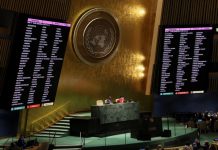BEIJING: At the centenary celebrations for the Chinese Communist Party on Thursday, China’s President Xi Jinping gave a brief message to world powers: the era of China being bullied was now ever.
Speaking above the giant portrait of Mao Zedong which dominates Tiananmen Square, from the podium where the famous chairman proclaimed the People’s Republic of China in 1949, Xi said the “era of China being bullied is gone forever”, praising the party for raising incomes and restoring national pride.
Drawing a line from the subjugation of the Opium Wars to the struggle to establish a socialist revolution in China, Xi said the party had brought about “national rejuvenation” lifting tens of millions from poverty and “altered the landscape of world development”.
Xi, wearing a Mao-style jacket, added the “great rejuvenation of the Chinese nation has entered an irreversible historical course” and vowed to continue to build a “world-class” military to defend national interests.
In the summer of 1921 Mao and a clutch of Marxist-Leninist thinkers in Shanghai founded the party which has since morphed into one of the world’s most powerful political organisations.
It now counts around 95 million members, garnered over a century of war, famine and turmoil, and more recently a surge to superpower status butting up against Western rivals, led by the US.
In a ceremony of pomp and patriotism, thousands of singers, backed by a marching band, belted out stirring choruses including “We Are the Heirs of Communism” and “Without the Communist Party there would be no New China” as maskless invitees cheered and waved flags in a packed Tiananmen Square.
A fly-by of helicopters in formation spelling ‘100’ — a giant hammer and sickle flag trailing — and a 100-gun salute followed, while young communists in unison pledged allegiance to the party.
Power, popularity and purges
Xi, whose speech braided the economic miracle of China with the longevity of the party, has cemented his eight-year rule through a personality cult, ending presidential term limits and declining to anoint a successor.
He has purged rivals and crushed dissent — from Uyghur Muslims and online critics to pro-democracy protests on Hong Kong’s streets.
The party has pivoted to new challenges; using tech to renew its appeal to younger generations — 12.55 million members are now aged 30 or younger — while giving a communist finish to a consumer economy decorated by billionaire entrepreneurs.
On Beijing’s streets, praise for the party was effusive from those willing to speak to foreign media.
“We should thank the party and the motherland,” said Li Luhao, 19, a student at Beihang University performing in the celebration.
A man surnamed Wang, 42, said: “When I was a child there was a blackout for one hour every night and electricity shortages.”
“Now the streets are full of light. Food, clothes, education, traffic are all better.”
While the president did not mention himself in the speech, “it is quite clear that much of the credit for China´s success belongs to Xi,” said Willie Lam, China analyst at the Chinese University of Hong Kong.
Xi has presented a defiant face to overseas rivals, revving up nationalist sentiment. He has batted back criticism of his government’s actions in Hong Kong, attitude towards Taiwan and treatment of the Uyghurs.
“The Chinese people will never allow any foreign forces to bully, oppress, or enslave us,” Xi said in his speech, to great applause.
“Whoever wants to do so will face bloodshed in front of a Great Wall of steel built by more than 1.4 billion Chinese people.”









